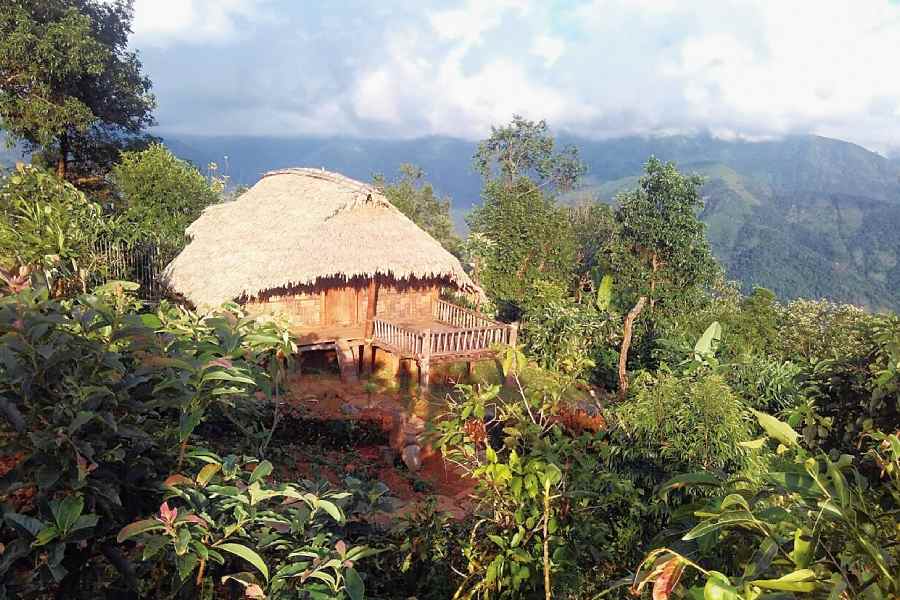The poll bugle and its ripple effect were the anticipated highlights of March. But just prior to this brouhaha, a joyous tapestry unfolded, in the scintillating colours and flavours of spring, in the Khasi hills of Meghalaya. Tourists and local residents who flocked to the three-day Monolith Festival witnessed a vibrant display of music, culture, cuisine, customs and community bonding at the Khasi Heritage Village at Mawphlang, nearly 27 kilometres from the state capital, Shillong, after an eight-year interregnum. Helmed by the Khasi Hills Autonomous District Council, the previous edition was held in 2016 and plans to hold one in December 2023 finally reached fruition this month.
Strewn with huts spread over eight acres, the uninhabited model village located across the Mawphlang sacred forest also has a museum exhibiting artefacts and traditional Khasi tools, an amphitheatre and a suspension bridge. The “main aim of the festival here is to reunite the 53 hima (Khasi kingdom or administrative unit) and provide a platform for indigenous musicians and craftspersons,” said a participant.
According to Kitkupar Shangpliang from the folk-fusion band, Summersalt, “The festival is as culturally organic as it can get. Very unique, as it gathers chieftains from all corners of the Khasi hills. The hyper-local approach blended well with the cosmopolitan crowd whose interest in the indigenous culture of the Khasi people is very obvious. All of this fits well with our root music, since we play the music of the land and its people. The audience was electric and the experience was purpose-driven.”
Initiated in 2013, the festival last fortnight was on a smaller scale than the one in 2016 (it had 80 food stalls instead of 200 and 40 handicraft stalls, down from the previous 70), but it did generate the joie de vivre in ample measure. Not to be compared with more traditional (and religious) events like Shad Nongkrem or Behdienkhlam, the Monolith Festival heralded spring with a much-needed flourish.
On another happy note, the Meghalaya government this month laid the foundation stone for a Tagore Cultural Complex at the Brookside complex in Shillong where the Nobel laureate, Rabindranath Tagore, had stayed in 1919. The Tagore researcher and local resident, Malabika Bisharad, who has been relentlessly campaigning for heritage status for Brookside and the setting up of a Tagore Cultural Complex, said she was delighted with the news but has now come to know of plans to cut the centuries-old trees in the complex to make way for parking lots since the temporary legislative assembly has been operating from this complex for over two decades (although the new assembly building at Mawdiangdiang is nearly complete).
In a letter to the chief minister, Conrad Sangma, she said: “I have come to know that three parking lots will be constructed for the benefit of the Assembly. Roads will be constructed. I feel the roads will damage the heritage site. Already they have cut down one ancient tree at the entrance of Brookside to make a road. The Prime Minister’s office requested the Directorate of Arts and Culture to preserve Brookside as a heritage site in memory of Rabindranath Tagore. You have also taken the initiative to do so. But so many roads and parking lots will definitely damage the complex.”
With the ministry of culture having sanctioned Rs 14 crore for the project and the Meghalaya government planning to complete it within two years, one dares to hope, even amid the election scenario, that the funds will be used judiciously and that the statuesque pines and eucalyptus that lend Brookside, the backdrop of Tagore’s Sesher Kobita, its distinctive character are not sacrificed. If only a model code of conduct could be applied to the destroyer of trees too.











